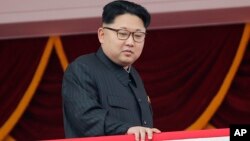North Korea has dismissed its minister of state security, considered a key aide to the secretive state's young leader, Kim Jong Un, following a series of high-level purges, South Korea said Friday.
Kim Won Hong was removed from office as head of the top spy agency in mid-January, apparently on charges of corruption, abuse of power and human rights abuses, Jeong Joon-hee, South Korea's Unification Ministry spokesman, said, confirming media reports.
Jeong said Kim was "first demoted from general to major-general after a party investigation, and then he was dismissed."
Purges not new
Kim Jong Un became leader in 2011 after the death of his father, Kim Jong Il, and his consolidation of power has included purges and executions of top officials, South Korean officials have said.
Park Hyung-joong, a senior researcher at the Korea Institute for National Unification, told VOA on Friday, "Once again, [Kim Jong Un] has used Kim Won Hong to enhance the position of the nation's ministry of state security to a higher level and then attacked the ministry through another branch. This shouldn't be seen as a sign that Kim Jong Un's grip on power has become undermined or [the regime's] identity is being challenged, but as a typical way of managing power by an authoritarian regime."
Last year, North Korea's vice premier for education was executed for not keeping his posture upright at a public event, South Korea said.
North Korea rarely announces purges or executions, although state media confirmed the 2012 execution of Kim's uncle, Jang Song Thaek, widely considered the country's second most powerful leader, for factionalism and crimes damaging to the economy.
A former defense minister, Hyun Yong Chol, is also believed to have been executed in 2015 for treason, according to the South's spy agency. It said he was killed with an anti-aircraft gun.
Reports difficult to verify
It is difficult to independently verify news about top officials in the North. Some previous reports of executions and purges have proved inaccurate.
Impoverished North Korea and the rich, democratic South are technically still at war because their 1950-53 conflict ended in a truce, not a peace treaty. The North regularly threatens to destroy the South and its main ally, the United States.
VOA Korea reporter Jenny Lee contributed to this report.





